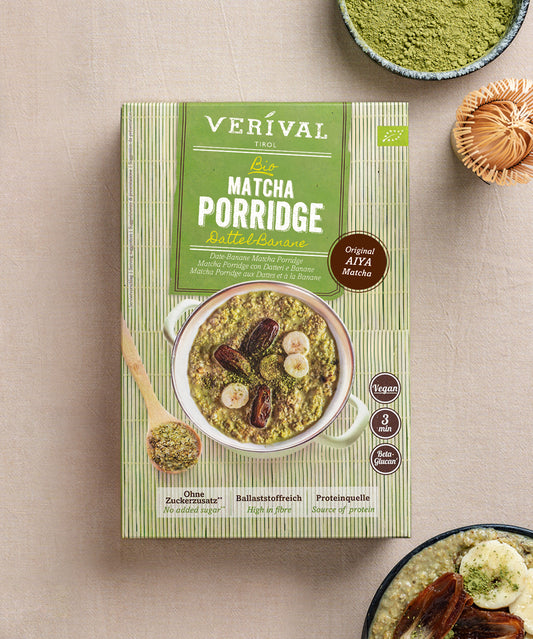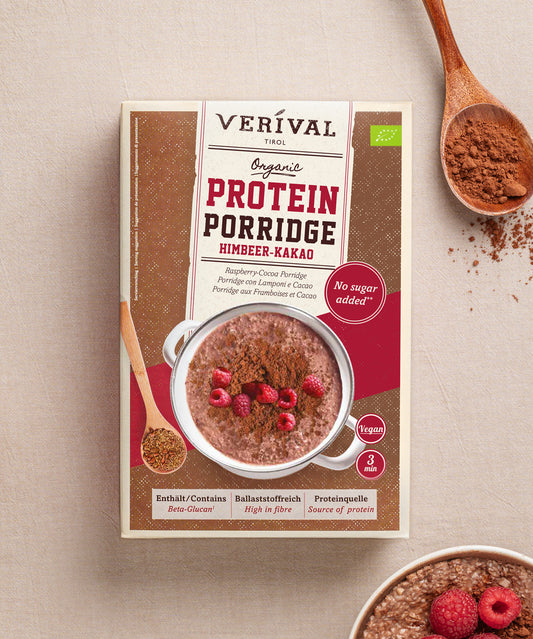More and more people are interested in the topic of leaky gut, i.e., increased permeability of the intestinal barrier, and are wondering how they can support their gut with the right diet. But what is really behind it, and what does science say about the connection between diet and gut health?
Verival organic breakfast with no added sugar – discover it now
What does “leaky gut” mean?
Leaky gut literally means “permeable intestine.” It refers to increased permeability of the intestinal mucosa, through which components such as undigested food, bacteria, or toxins can enter the bloodstream.
In research, this phenomenon is referred to as increased intestinal permeability. It is a condition that is observed in various diseases such as celiac disease, Crohn's disease, or obesity.
However, the commonly used term “leaky gut syndrome” as a separate disease is not scientifically recognized. Although intensive research is being conducted into how the permeability of the intestinal wall could be related to symptoms such as fatigue, skin problems, or inflammation, there is currently no clear evidence that a “leaky gut” alone causes such symptoms.
So let's summarize: Increased intestinal permeability is scientifically recognized, but “leaky gut syndrome” as a separate diagnosis is not.
Why is the intestinal barrier so important?
The intestinal barrier protects our body from unwanted intruders. It consists of a mucus layer, a cell layer with so-called tight junctions, and the intestinal microbiome. This refers to the totality of beneficial bacteria in the intestine.
This structure ensures that only selected nutrients enter the bloodstream, while harmful substances and pathogens are repelled.
At the same time, the intestinal barrier plays a central role in the immune system: around 70 to 80 percent of immune cells are located in the intestine. A stable barrier therefore not only supports digestion, but also the body's defenses. If it is weakened, this can lead to inflammatory processes that are associated with various diseases.
Nutrition & intestinal health
Nutrition has a major influence on intestinal health. A fiber-rich, natural diet promotes the growth of beneficial bacteria, strengthens the mucous membrane, and contributes to the stability of the intestinal barrier.
Fiber serves as food for the microbiome. Its fermentation by intestinal bacteria produces short-chain fatty acids such as butyrate, which have anti-inflammatory effects and can stabilize tight junctions.
A diet rich in vegetables, whole grains, legumes, and fermented foods is therefore considered an important part of a healthy leaky gut diet.
In contrast, foods that are high in sugar, fat, or heavily processed can upset the balance of the microbiome, promote inflammation, and weaken the intestinal barrier.
Foods that can strengthen the gut
Those who want to specifically support their gut health and intestinal barrier will benefit from a diet rich in fiber, vitamins, and probiotic cultures. The following are particularly recommended:
Oats
Oats provide soluble fiber, especially beta-glucans, which serve as prebiotics and promote beneficial gut bacteria. They also support the formation of butyrate, which strengthens the intestinal mucosa. A daily breakfast of oatmeal or porridge is therefore an easy way to support the intestinal barrier in the long term.
Vegetables and fruit
Fiber-rich vegetables such as broccoli, carrots, celery, and chicory provide valuable sources of inulin and pectin. Fruits such as apples, berries, and bananas also contain soluble fiber and secondary plant substances that have antioxidant and anti-inflammatory effects.
Fermented products
Foods such as yogurt, kefir, sauerkraut, and kimchi contain probiotic lactic acid bacteria that enrich the microbiome and promote the development of stable intestinal flora.
Legumes and nuts
Lentils, beans, chickpeas, almonds, and walnuts provide fiber, plant protein, and healthy fats, which are important building blocks for a gut-friendly diet.
A balanced leaky gut diet combines all of these foods regularly to provide the gut with sufficient nutrients and prebiotics.
Foods that can stress the intestinal barrier
Certain dietary habits can impair gut health and weaken the barrier. The most common stress factors include:
Sugar and refined carbohydrates
High sugar consumption promotes the growth of unfavorable bacteria and can disrupt the balance in the microbiome. This also applies to white flour products, sweets, and sweetened beverages.
Alcohol
Regular or excessive alcohol consumption has been shown to have a negative effect on the intestinal mucosa. It increases the permeability of the intestinal wall and promotes inflammatory reactions.
Highly processed foods
Ready meals, chips, fast food, and sausage products often contain additives, emulsifiers, and preservatives that can disrupt the microbiome. They also lack valuable fiber, which is essential for healthy gut flora.
Saturated fats and trans fats
A diet high in fried foods and animal fats can promote inflammation and negatively affect the composition of the gut flora.
Excessive caffeine consumption
Large amounts of caffeine can increase intestinal activity and promote irritation in sensitive individuals. Moderate consumption is key here.
If you want to optimize your leaky gut diet, you should reduce your intake of such foods and focus on natural, unprocessed products.
Conclusion
Research clearly shows that a healthy intestinal barrier is crucial for digestion, the immune system, and general well-being. While increased permeability of the intestinal wall is scientifically recognized, “leaky gut syndrome” as a separate disease has not yet been proven.
The good news is that a targeted diet can support the gut. A plant-based, fiber-rich, and as natural as possible diet with oats, vegetables, fruit, and fermented foods strengthens the microbiome and contributes to a stable intestinal barrier.
A conscious diet is therefore a central building block for a healthy gut and thus for overall well-being.
Discover Verival's healthy breakfast variety.
Frequently asked questions
What foods should you eat to heal leaky gut?
The goal is to strengthen the intestinal barrier, not to “heal” it. High-fiber, natural foods such as oats, vegetables, fruit, legumes, and fermented products such as yogurt or sauerkraut are recommended. They promote healthy gut flora and support the mucous membrane.
What should I avoid eating if I have leaky gut?
Avoid sugary, highly processed foods, alcohol, and products with lots of additives. Too much saturated fat or fried foods can also put strain on the microbiome and weaken the intestinal barrier.
Why does leaky gut occur?
Increased permeability of the intestinal wall can be caused by inflammation, an unbalanced diet, chronic stress, alcohol consumption, or certain diseases such as celiac disease or Crohn's disease. It often occurs as a side effect of such factors, not as a separate disease.
























